Iowa State Patrol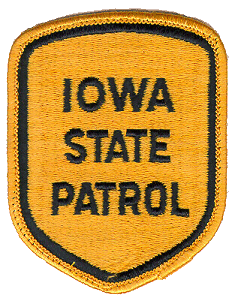
Iowa State Patrol
From 1919 until 1935, the Iowa Motor Vehicle Department enforced state traffic laws at the hands of their inspectors and agents as they were known then. In 1933, 15 Motor Vehicle Inspectors were hired to patrol Iowa's highways as speeds by motor vehicles increased with the proliferation of paved roadways as did the death and injury rate.
In 1935, the Iowa Highway Safety Patrol was formed with 50 new officers. 37 cars and 12 motorcycles commenced the official patrol duties for the new force. Cars were Ford V-8's, Chevrolets and some Pontiacs, while the motorcycles were Indian Model 74's.
The state was divided into 10 patrol districts and 1942 saw patrol motorcycles phased-out. In 1946, two more patrol districts were added to bring the total to 14. In 1952, officers began painting the number of current Iowa traffic fatalities onto the trunks of their patrol cars.
In 1957, the number of patrol officers increased to 275 and that number increased to 410 ten years later. In 1975, the agency became known as the Iowa State Patrol, and officers became known as "Troopers".
It was 3 years prior that Area Headquarters were changed to "divisions" and districts were renamed "Posts". In 1979, the Patrol put into service two Kawasaki 1000 motorcycles. One was involved in a traffic collision just 4 days into the program.
The patrol celebrated its 50th Anniversary in 1985.
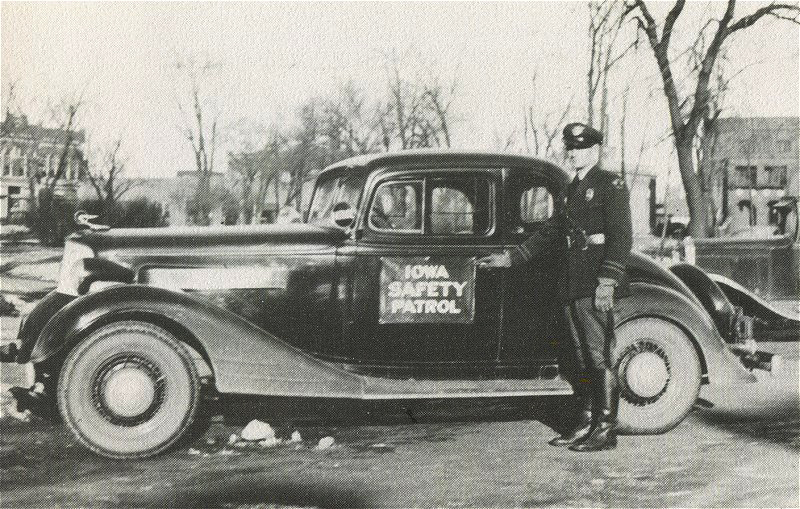
License plates used on the patrol vehicles of the IMVD prior to the formation of the Patrol is unknown.
When the Iowa Highway Safety Patrol was formed in 1935, the patrol cars sported state official license plates front and rear. The plates were made of embossed steel and measured approximately 12 5/8”x 5 1/2”. They utilized the same color combinations of passenger license plates of the day. The earliest known record of such a plate in use by the IHSP is numbered 5022 as seen in the photo below. The color would have been white over dark blue. It is unknown if the number blocs for the Patrol were random or reserved.
In addition to the IOWA OFFICIAL license plates, the earliest Iowa Safety Patrol cars sported a heavy metal sign plate measuring approximately 8 1/2" X 14". The sign plate had a black painted background with with lettering indicating IOWA (over) PATROL in white with 99 red reflective "cat's eyes" on the lettering to indicate Iowa's 99 counties.
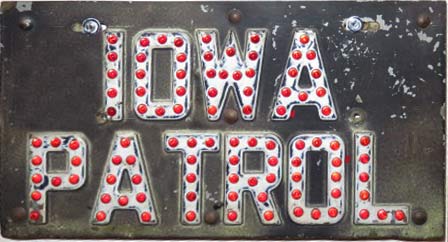 1935-unknown sign plate.
1935-unknown sign plate. 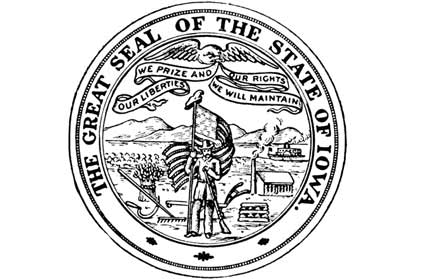
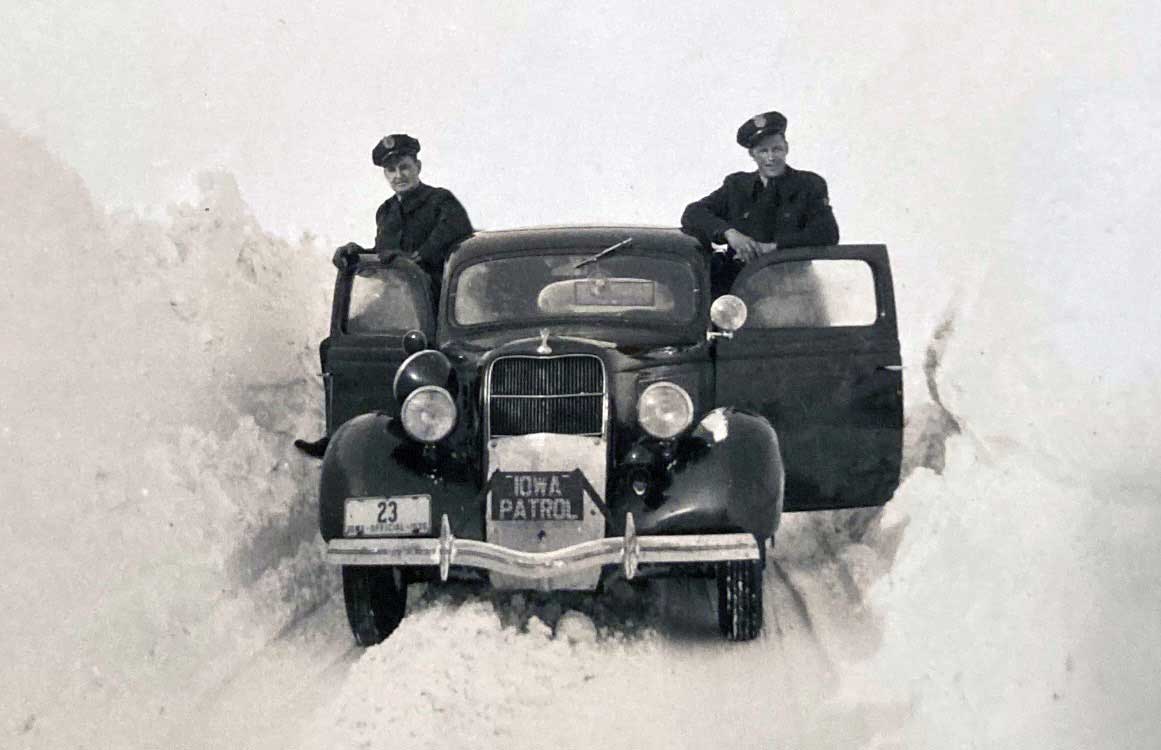 1936 OFFICIAL # 23 license plate and the "Cat's Eyes" IOWA PATROL plate sign
1936 OFFICIAL # 23 license plate and the "Cat's Eyes" IOWA PATROL plate sign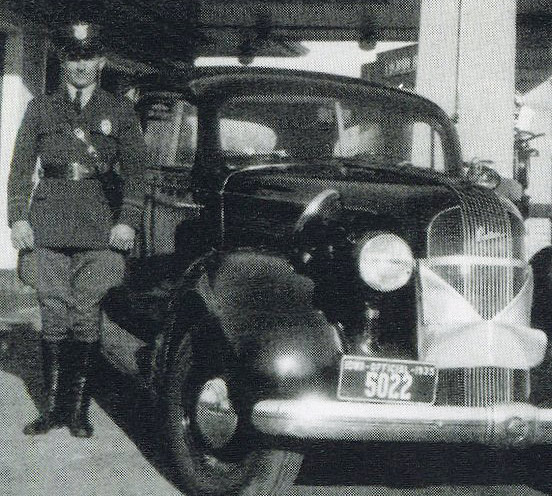
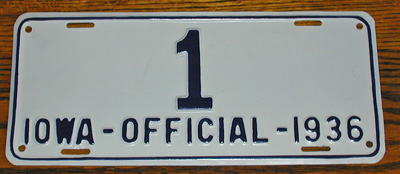 1936 issue. Embossed steel.
1936 issue. Embossed steel.
Although not confirmed, it could be surmised that the pattern of issuance for the next few years would have gone as follows:
1937: Embossed steel. 12 5/8”x 5 1/2”. White over dark blue. IOWA-OFFICIAL-1937 over a number up to 4 digits
1938: Embossed steel. 12 5/8”x 5 1/2”. Dark blue over white. A number up to 4 digits over IOWA-OFFICIAL-1938
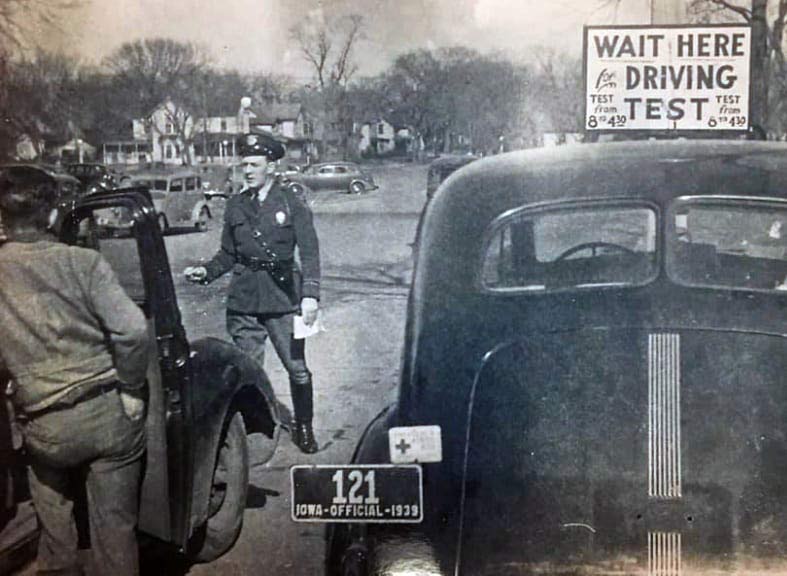
NOTE: There has been speculation with respect to a -titled- 1939 IHSP license plate used concurrrent to the OFFICIAL base shown above. There has been no identified size or material, but it has been described as having white chracters over a dark blue background. It is supposed to have 1939 stacked vertically along the left margin followed by a large star emblem (believed to be black) then followed by a two digit number embossed over IOWA over PATROL. To date, there has been no confirmed verification of this type.
1940: Embossed steel. 12 5/8”x 5 1/2”. Dark blue over orange. IOWA-OFFICIAL-1940 over a number up to 4 digits.
There is a marvelous period photograph showing the IHSP Colonel of the day and a woman believed to be his secretary in the process of switching over the 1940 OFFICIAL license plate with a distinctive and graphic 1941 IOWA PATROL license plate. The 1940 plate which is still mounted on the patrol car bears number 36, so it can be assumed that lower numbered OFFICIAL plates were used at that time as opposed to the higher 4 digit numbers as seen only 5 years earlier.
1941 issue. First titled and graphic State Patrol issue. Assumed to be embossed steel and approximately 12 5/8”x 5 1/2”. Likely black characters over yellow. OFF stacked vertically down left margin. A stylized five-point star motif which appears screened and outlined in reflective "cat's eyes". Assignment number over IOWA over PATROL and 1941 stacked vertically down right margin.
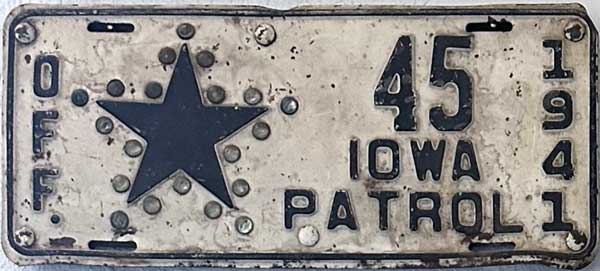 1941 issue. Embossed steel
1941 issue. Embossed steel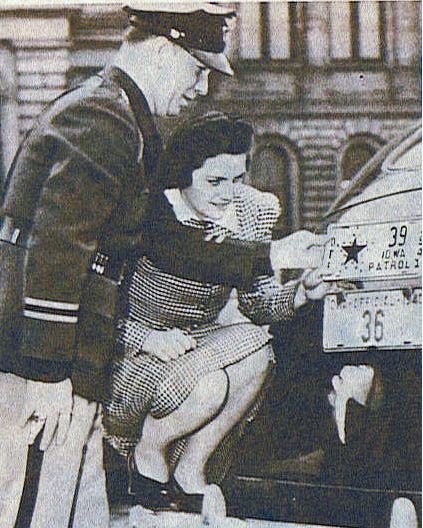 1941 issue. First titled and graphic license plate issued for the Patrol.
1941 issue. First titled and graphic license plate issued for the Patrol.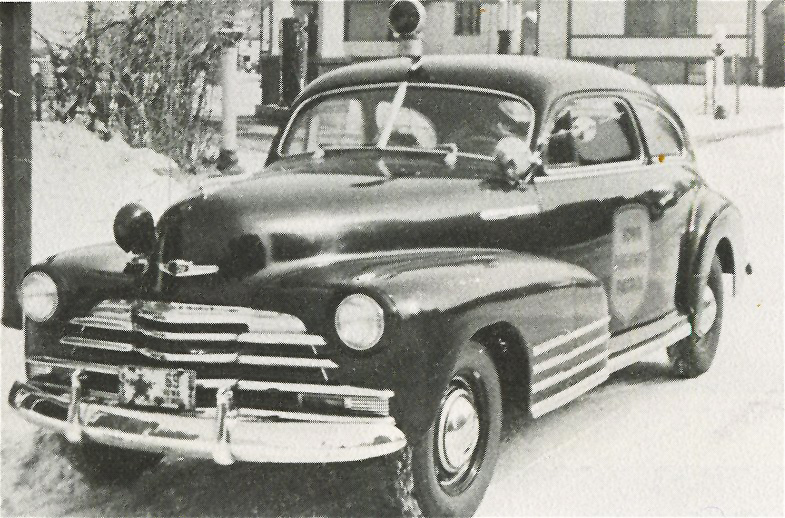
1942 issue appears to be the same layout as the 1941, however with colors in reverse (light characters over dark). The only known example of the 1942 issue is seen in the photo below which shows an IHSP car that had sustained front end damage. The plate can be clearly seen and appears that it utilized reflective material on the characters, particularly for the stylized five-point star that occupied the left portion of the plate.
Iowa issued windshield decals in 1943 and 1944 as part of the nation's efforts to preserve metal for the America's War commitment at the time.
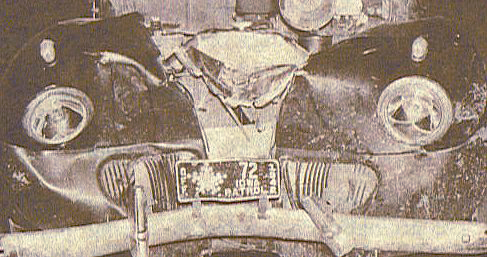
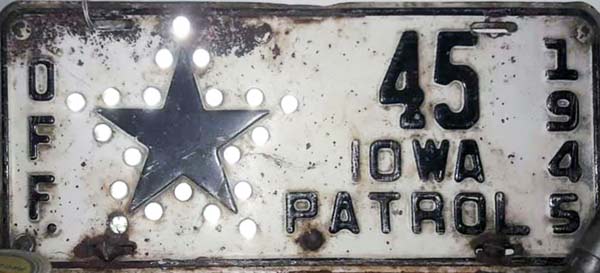 1945 issue. Embossed steel.
1945 issue. Embossed steel. 
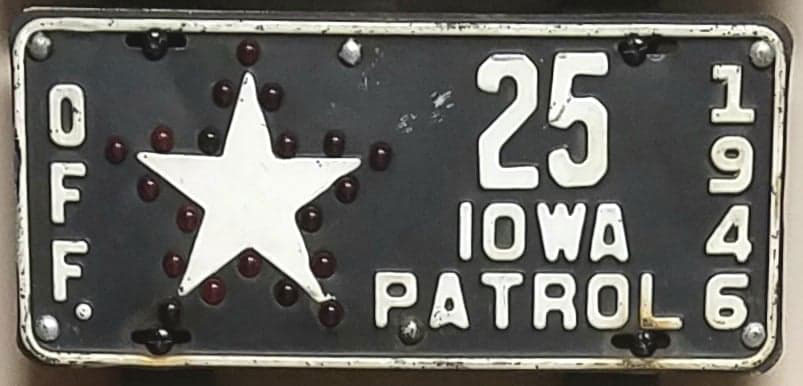 1946 issue. Embossed steel.
1946 issue. Embossed steel. 
The next license plate issue began the era of undated agency-titled license plates for the Patrol. Nobody seems to know exactly when these plates commenced issuance, but based on period photographs, it's a safe bet that they began to adorn the front and rear of IHSP vehicles around 1947.
The plates were made of embossed steel and measured approximately 12 5/8”x 5 1/2” The color was black over yellow/orange with the assignment number embossed over IOWA over PATROL. Plates intended for the rear of the car had large red star decals flanking the number and title, and plates intended for the front of the car had the same star decals, however in blue. Some star emblems were centered straight and others were applied with a tilt: clockwise tilt for the left star and a counterclockwise tilt for the right.
A wide variety of color background was used during this time. Some were painted, some had experimental versions of reflective paint and coverings. The earliest of this reflective background is shown on the photo below of plate number 273. The experimental sheeting had a grid of small perforations for reasons unknown. As the plate became more and more exposed to the elements, the edges of these perforations began to show signs of bleed-though to varying degrees. As time went on, reflective backgounds became more durable including the use of Flex-O-Lite material which was made-up of finely crushed glass bead material.
 Circa 1947-1950's issue rear plate. Embossed steel.
Circa 1947-1950's issue rear plate. Embossed steel.
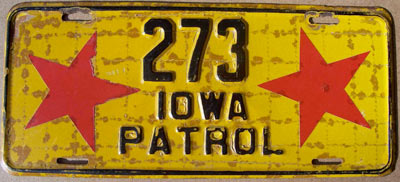 Circa 1947 to 1950's issue rear plate. Embossed steel.
Circa 1947 to 1950's issue rear plate. Embossed steel. 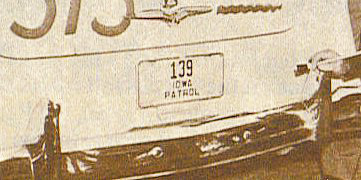 Circa 1952. Appears to not have five-pointed star decals affixed.
Circa 1952. Appears to not have five-pointed star decals affixed.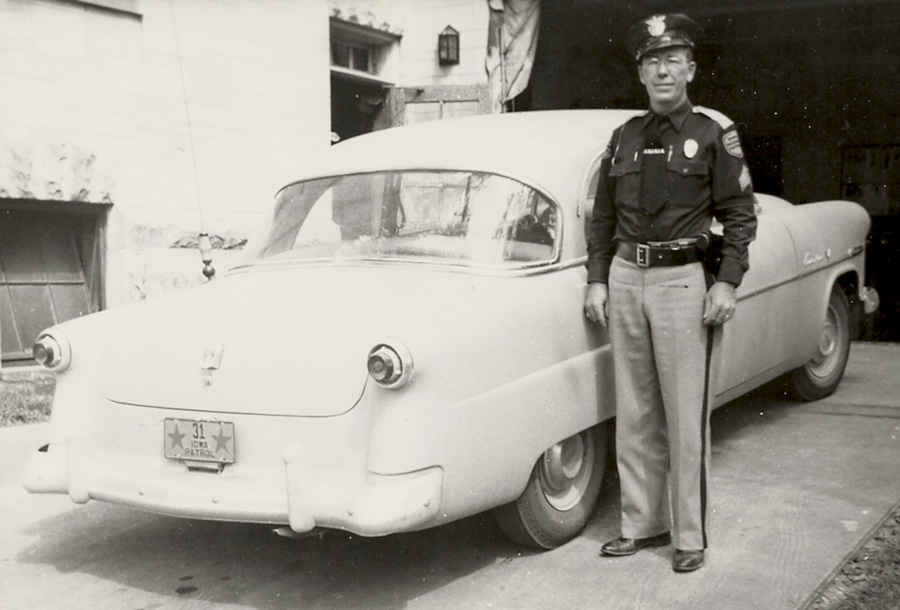
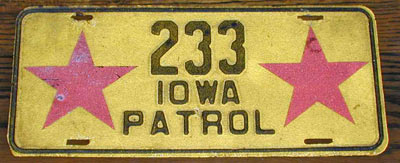 Early 1950's issue rear plate.
Early 1950's issue rear plate. 
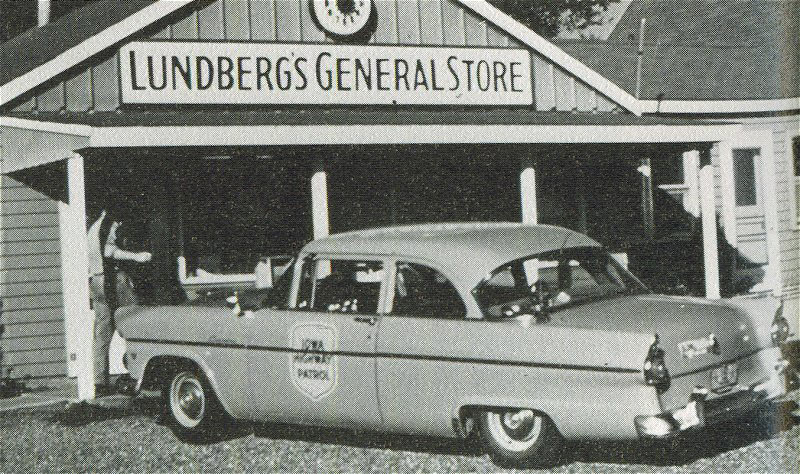
For several years, Norm Ratcliffe owned the 1950's Iowa Patrol blue star license plate #91 seen below.
In 2022, that license plate changed hands to James Wheeler where #91 was repatriated back to its home state of Iowa.
James did some research and discovered that this license plate was issued to Iowa State Patrolman Dean Kemmerer, a World War 2 veteran who served in the siege of Bastogne and the Battle of the Bulge with the 101st Airborne as a paratrooper.
When Dean returned home to Iowa, he eventually joined the Iowa Highway Patrol in 1950 and was bestowed badge #91.
On February 3, 1959 a small charter airplane airplane crashed in a cornfield near Clear Lake Iowa killing rock and roll legends, Buddy Holly, Ritchie Valens and "Big Bopper" J.P. Richardson along with the pilot who had been flying on instruments in poor wintry and low light conditions.
The call-out to help at this horrific scene resulted in Patrolman Kemmerer being dispatched where he was the second to arrive in this frozen cornfield in his 1959 IHP Ford bearing blue star Iowa Patrol license plate #91.
The license plate you see below this paragraph was an on-site "silent witness" to the scene known as "The Day The Music Died", famed by the Don McLean song "American Pie".
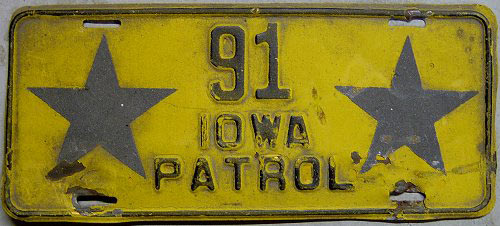 Early 1950's issue front plate. Embossed steel.
Early 1950's issue front plate. Embossed steel. 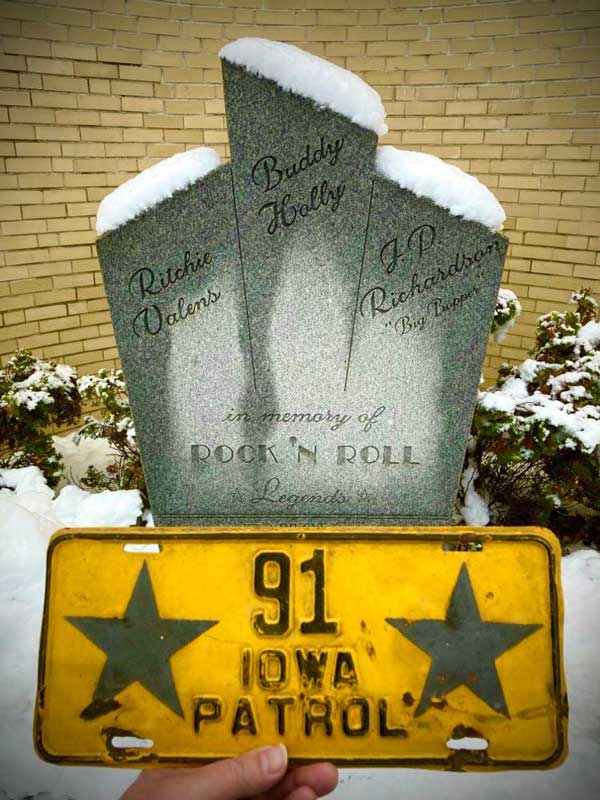 #91 returned to the scene 63 years later. (Courtesy James Wheeler)
#91 returned to the scene 63 years later. (Courtesy James Wheeler)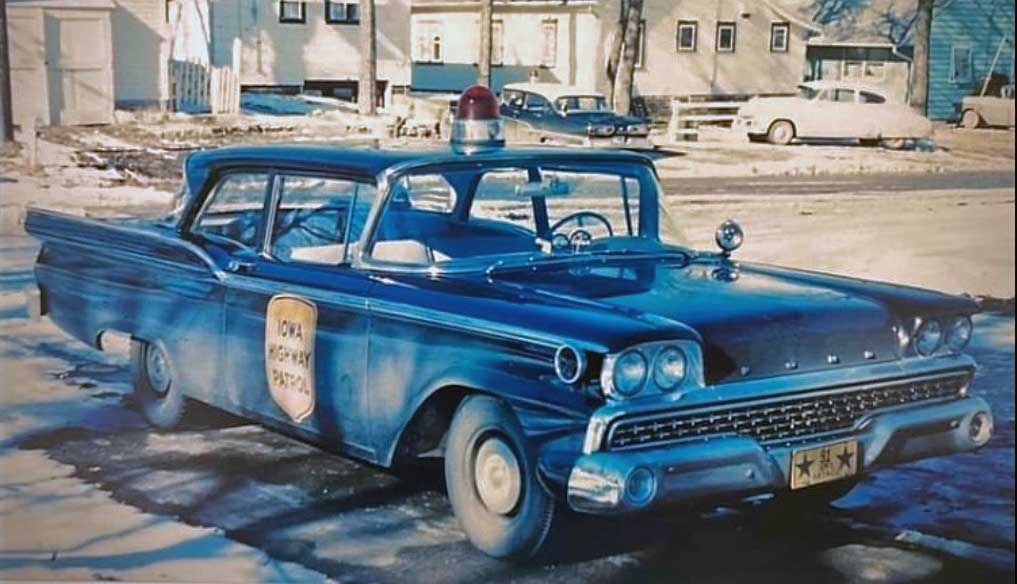 Patrol car of Ptlm. Dean Kemmerer #91 that was second on scene of the February 1959 airplane crash that claimed the lives of Buddy Holly, Ritchie Valens and J.P. "Big Bopper" Richardson. Invoked as "The Day The Music Died" in Don McLean's song "American Pie"
Patrol car of Ptlm. Dean Kemmerer #91 that was second on scene of the February 1959 airplane crash that claimed the lives of Buddy Holly, Ritchie Valens and J.P. "Big Bopper" Richardson. Invoked as "The Day The Music Died" in Don McLean's song "American Pie" 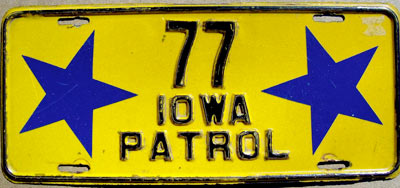 Early 1950's issue front plate.
Early 1950's issue front plate. 
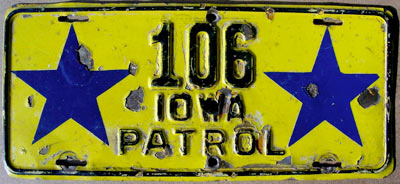 Early-Mid 1950's issue front plate. Embossed steel.
Early-Mid 1950's issue front plate. Embossed steel. 
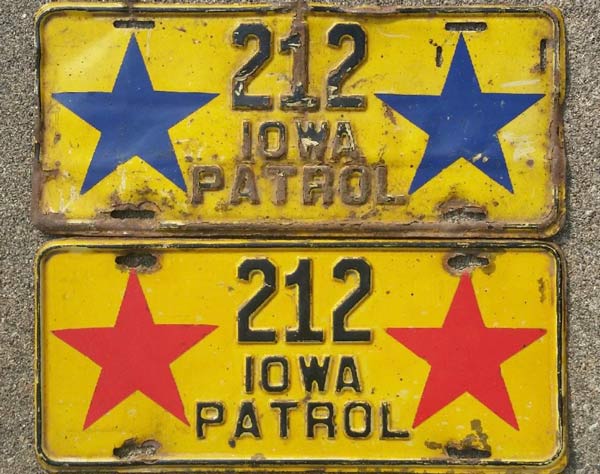
First set of ISP license plates issued to Ptlm Virgil Stammeyer upon his appointment to the Patrol in August of 1951.
In June of 1990, just days before his retirement after 39 years of service, a husband and wife crime duo from Ohio committed an armed robbery of a grocery store in Maquoketa.
As they fled, Stammeyer engaged in a high speed highway pursuit of the pair. During the chase through 2 counties, he was shot in the throat and shoulders by the fleeing felons. Despite his grave injuries, he pressed-on until the robbers crashed where the husband turned the gun on his wife and murdered her and he was arrested.
Stammeyer was honored with the Commissioners Certificate of Valor.
Virgil Stammeyer passed away in May of 2008.
(Courtesy James Wheeler)
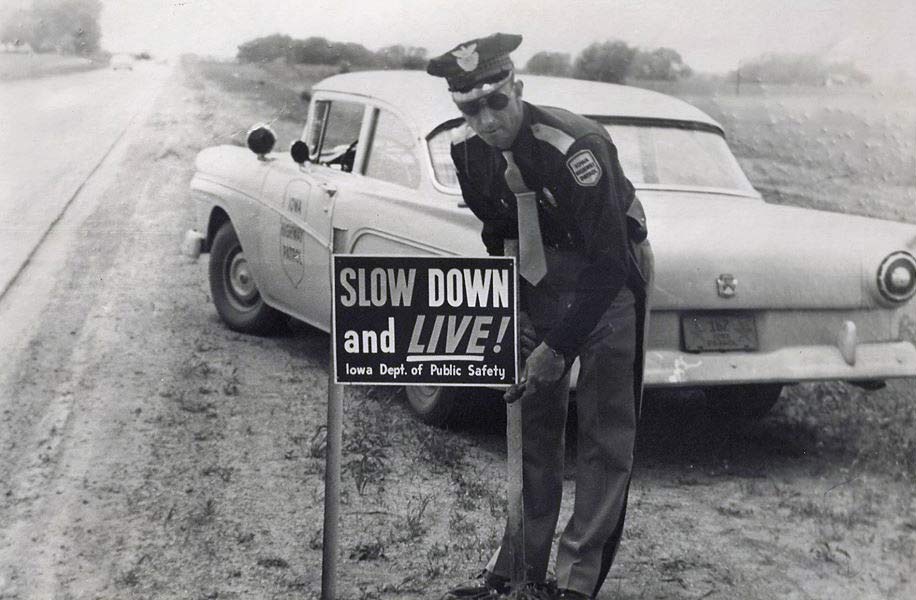
In 1956, all license plates in North America were required to be a dimension of 12”x 6”. License plates of the Iowa State Highway Patrol issued the new plates to their patrol vehicles still with red star plates on the rear and blue star plates on the front. The earlier versions of these plates had a much-improved reflective bright yellow background and used the title HIGHWAY PATROL screened along the bottom of the plate in black. The state name was screened along the top in black as well, and only the black border and the assignment numbers were embossed. The star emblems were still applied decals on the earlier types and some were painted on. These plates were issued in triplicate. A small engraved number 1, 2 or 3 was found in the top left corner on the older versions of this plate, and in the bottom right corner on later issues. The third plate was kept by fleet management as a replacement plate should one of the other two plates gone missing.
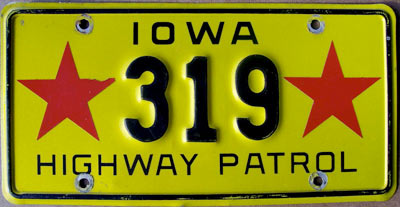 Circa 1957-1970's issue.
Circa 1957-1970's issue. 
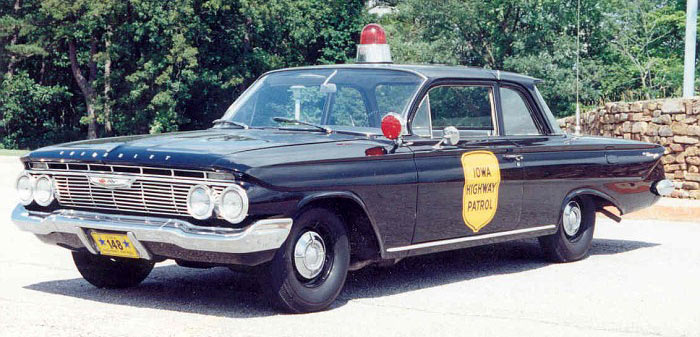
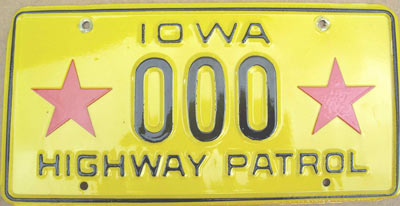 Unusual pre-1975 Sample issue.
Unusual pre-1975 Sample issue.
 Possibly issued and used by the Iowa Highway Patrol Auxiliary.
Possibly issued and used by the Iowa Highway Patrol Auxiliary. 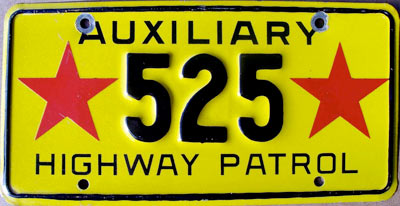 Iowa Highway Patrol Auxiliary
Iowa Highway Patrol Auxiliary 
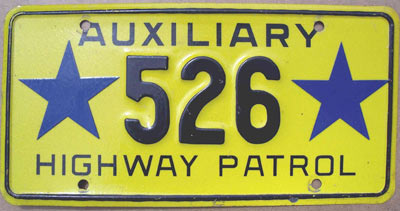 Iowa Highway Patrol Auxiliary
Iowa Highway Patrol Auxiliary 
In 1975, the Iowa Highway Patrol became the Iowa State Patrol. As a result, the agency's license plates were also re-titled to reflect the new name. The plates issued with STATE PATROL along the bottom utilized a darker reflective yellow-orange background and applied decal stars. The use of blue star plates was discontinued and the Patrol only utilized red star plates for front and rear. This earlier STATE PATROL issue was issued in triplicate. A small engraved number 1, 2 or 3 was etched into the bottom right corner of the plate. The number 3 plate was once again used as a spare. It was at this time that it was believed that the number used on the plates was the badge number of the assigned Trooper.
It is believed that it was with this issue that blue star motifs for front license plates were discontinued.
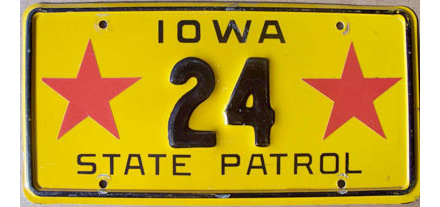 Circa 1975-1980's issue.
Circa 1975-1980's issue. 
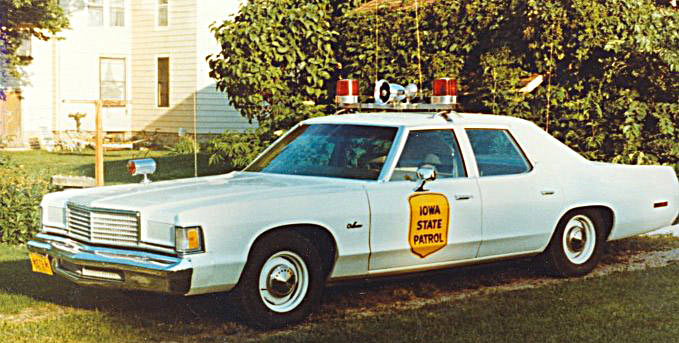
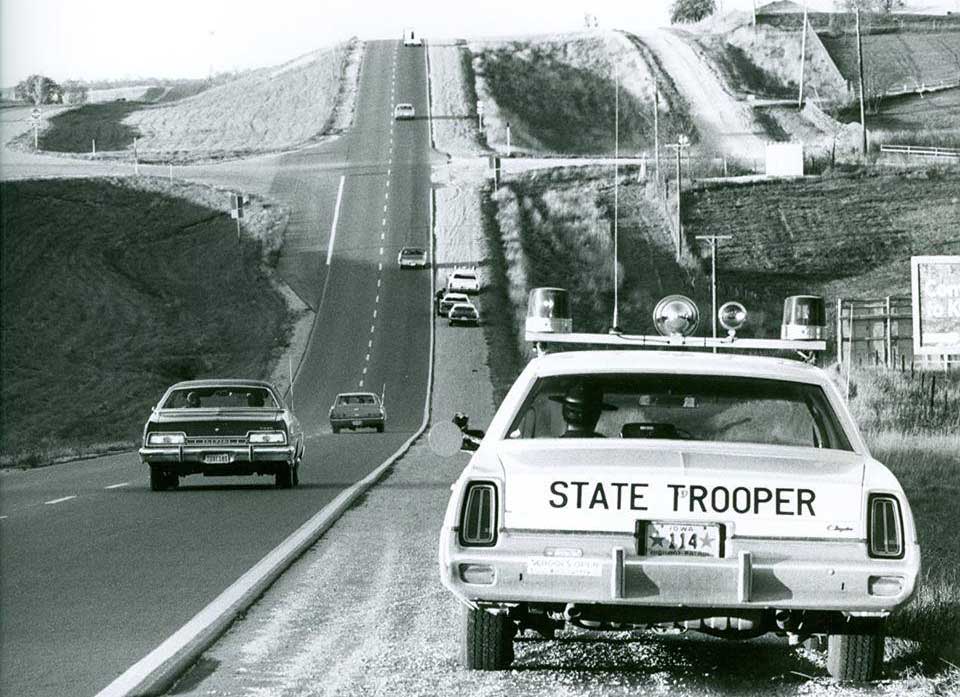 (Courtesy Tom Sheehy)
(Courtesy Tom Sheehy)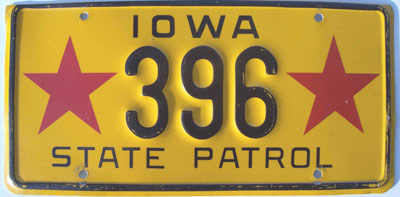 Mid-1970's-1980's issue.
Mid-1970's-1980's issue. 
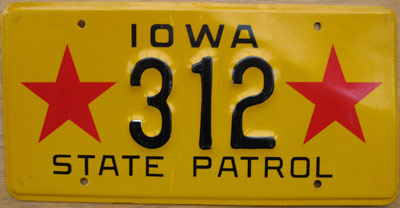 1980's issue. Embossed aluminum
1980's issue. Embossed aluminum
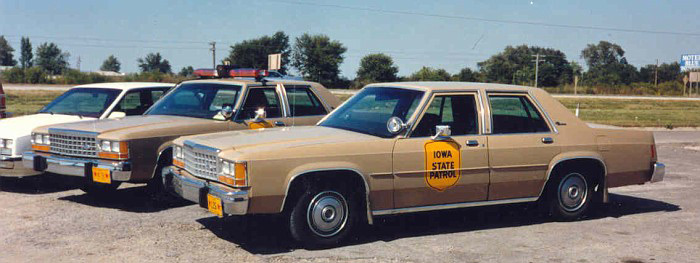
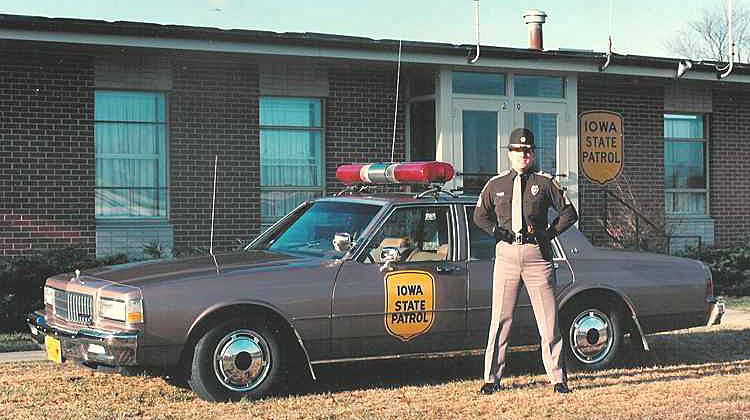
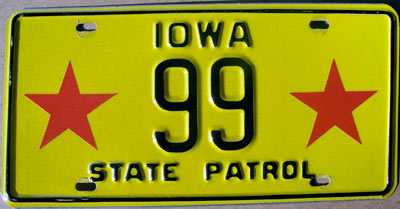 1980's-1990's issue. Manufactured by Iowa Department of Corrections. State name and STATE PATROL embossed. Brighter refelctive yellow background.
1980's-1990's issue. Manufactured by Iowa Department of Corrections. State name and STATE PATROL embossed. Brighter refelctive yellow background. 
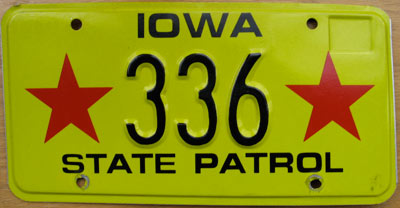 1990's-2000's issue.
1990's-2000's issue. 
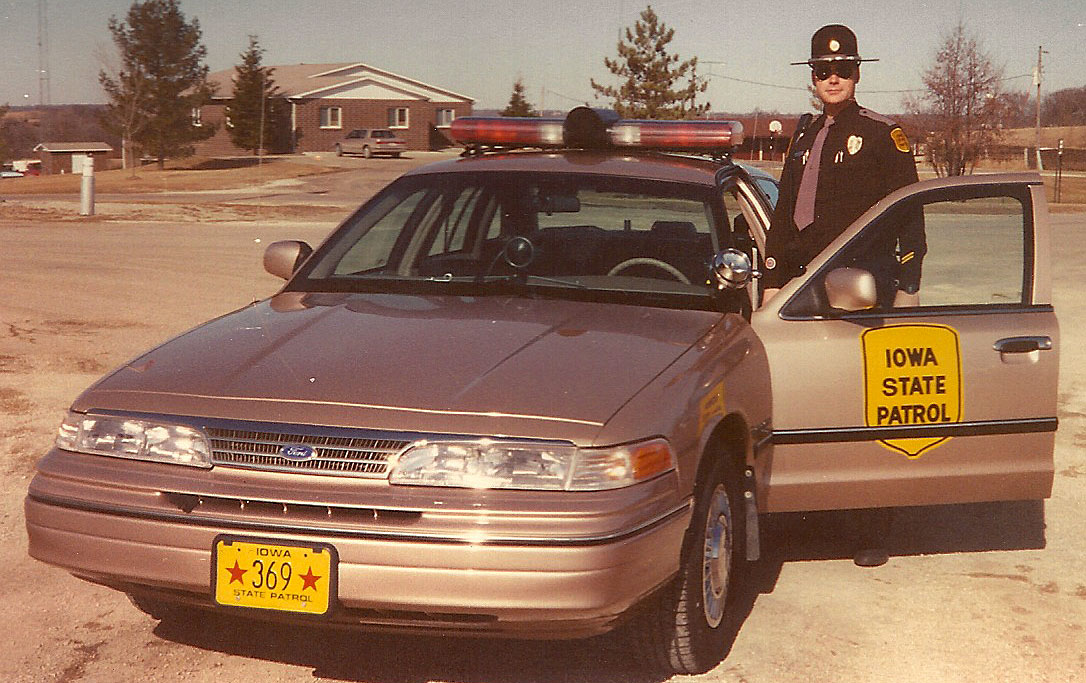
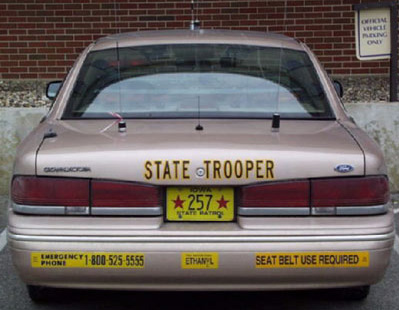
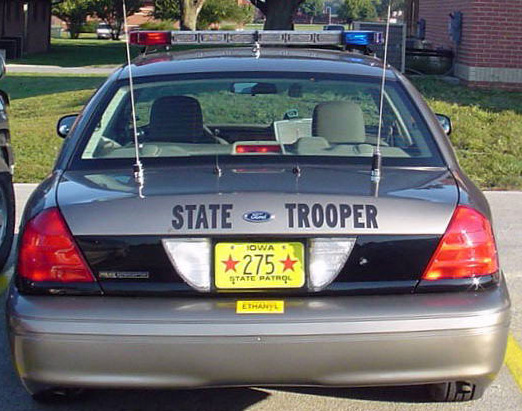
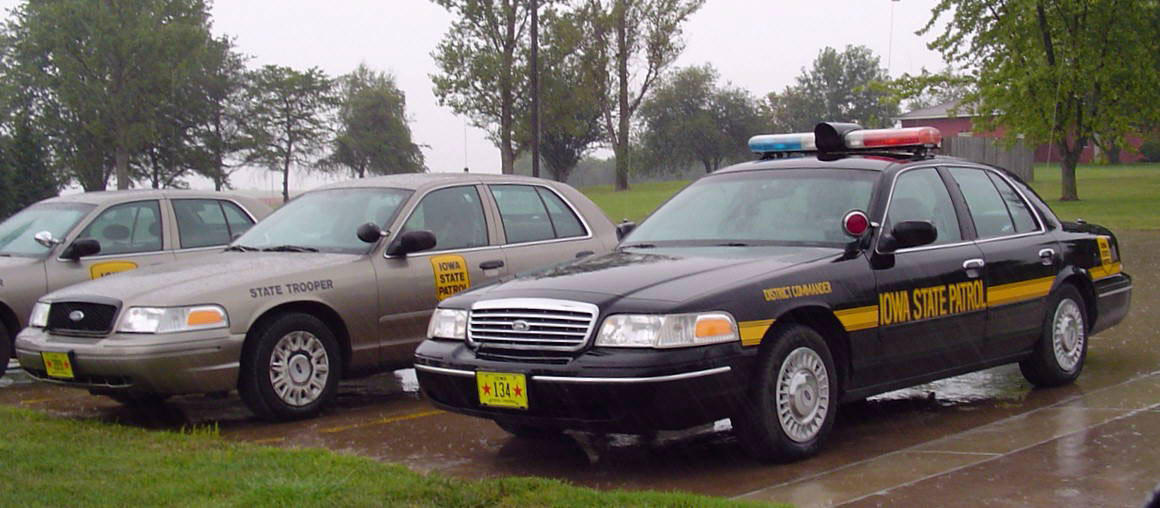
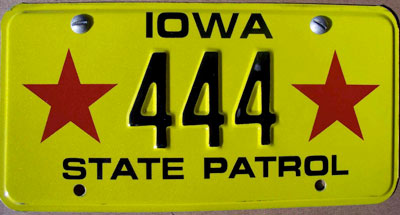 2000's issue.
2000's issue.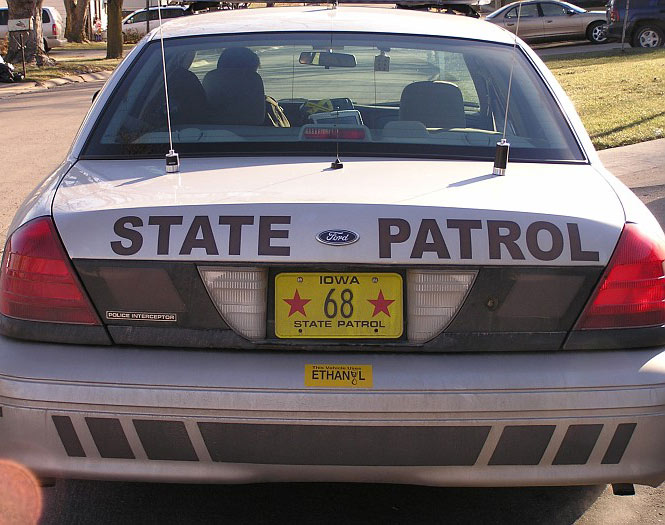
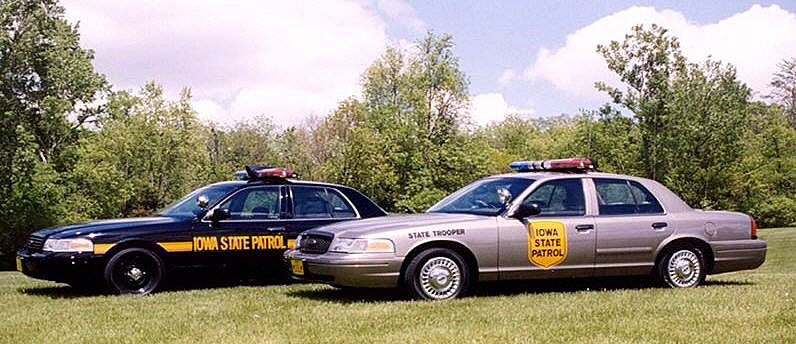
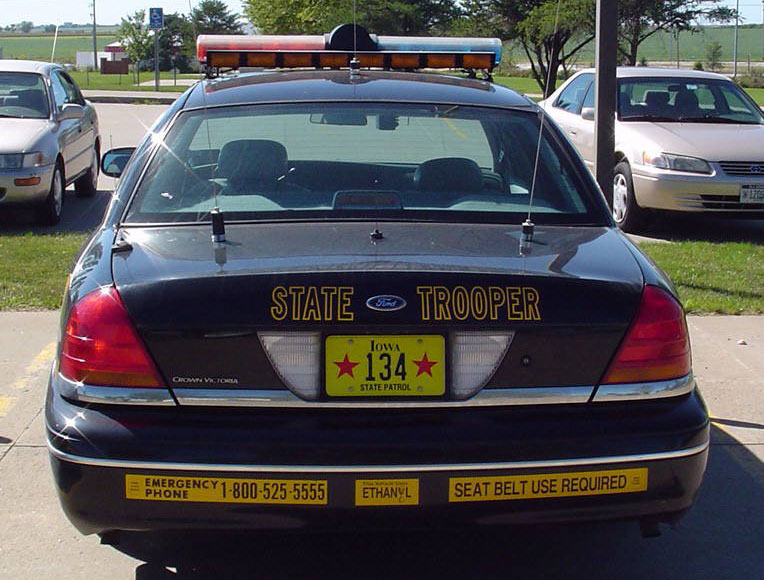
Around 2007, Iowa State Patrol license plates began to utilize a new stylized font for the state name and a smaller/tighter font for STATE PATROL along the bottom.
In 2010, The Iowa State Patrol celebrated their 75th Anniversary. A special commemorative license plate was issued to showcase the Diamond Anniversary milestone. The plate was still distinctively bright reflective yellow with red five-point stars flanking the assignment/badge number. The top of the plate reads: IOWA STATE PATROL with Guided by Tradition- Driven to Serve below it. The left red star has 1935 inscribed in the center and the right star has 2010 inscribed in the center. Both stars also have an off-set silhouette in gradient shades of grey. The assignment/badge number is silkscreened in black in the center of the plate over an outline of the state. The bottom section of the plate has a red scroll ribbon with 75th Anniversary inscribed. These plates were completely flat-screened. A subdued helix design security watermark runs down the center of the plate. Some samples bearing three zeroes were made available.
Assigned plates were affixed with tamper-proof fasteners to prevent theft.
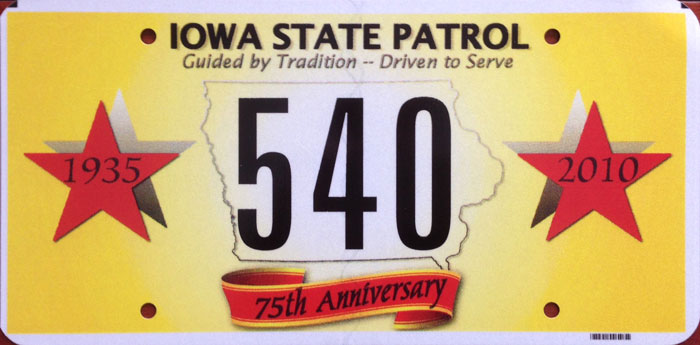 2010 75th Anniversary issue.
2010 75th Anniversary issue. 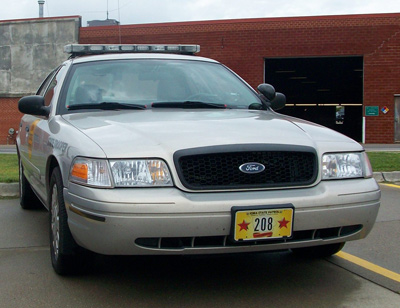
In 2020, The Iowa State Patrol celebrated their 85th Anniversary. A special commemorative license plate was issued to showcase the milestone. The plate was still distinctively bright reflective yellow on the top and bottom thirds of the plate and white in the center. There is a red five-point star with blue underlay occupying the top corners of the plate. The top of the plate reads: IOWA STATE PATROL with Courtesy-Service-Protection below it. The assignment/badge number is silkscreened in black in the center of the plate and flanked on either side by badge motifs. The left badge is a depiction of the first issue patrol badge and the right one depicts the current style badge. The bottom section of the plate has 1935 silkscreened in black at the bottom left corner, while the right bottom corner has 2020 inscribed the same way. Along the bottom center of the plate is 85th Anniversary in stylized red font.
These plates were completely flat-screened.
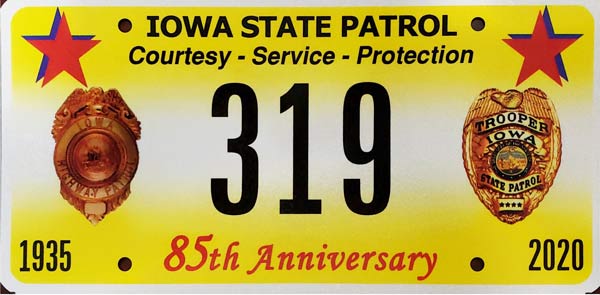 2020-Current 85th Anniversary issue.Silkscreened aluminum.
2020-Current 85th Anniversary issue.Silkscreened aluminum.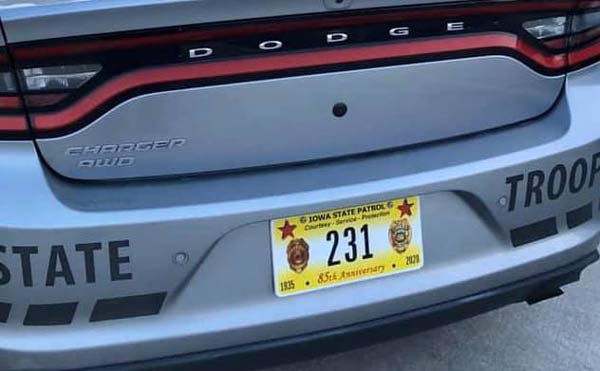 (Courtesy Steven Anders)
(Courtesy Steven Anders)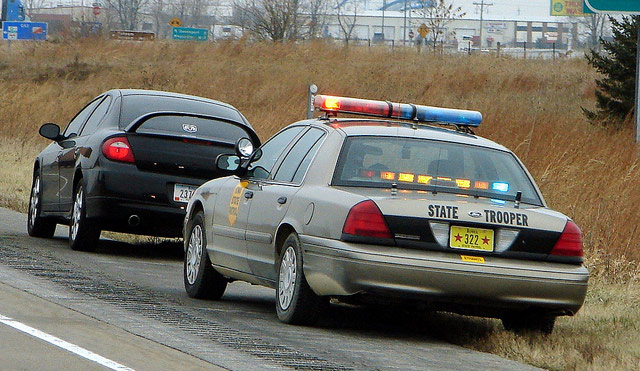
The Iowa Highway Safety Patrol utilized many motorcycles in the early years, however the number of critical and fatal injuries of Patrol officers on motorcycles curtailed the use of the motorcycle in the later years. License plates used on IHSP motorcycles were embossed steel OFFICIAL plates and measured approximately 7 5/8”x 3 5/8”. The only surviving examples appear to be black over cream/white. IOWA stacked and running down the vertical left margin of the plate the number embossed in the center and the year stacked and running down the vertical right margin of the plate. OFFICIAL is embossed along the entire bottom portion of the plate.
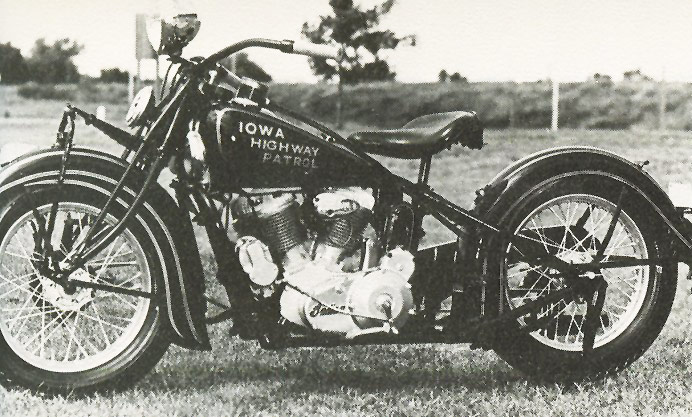
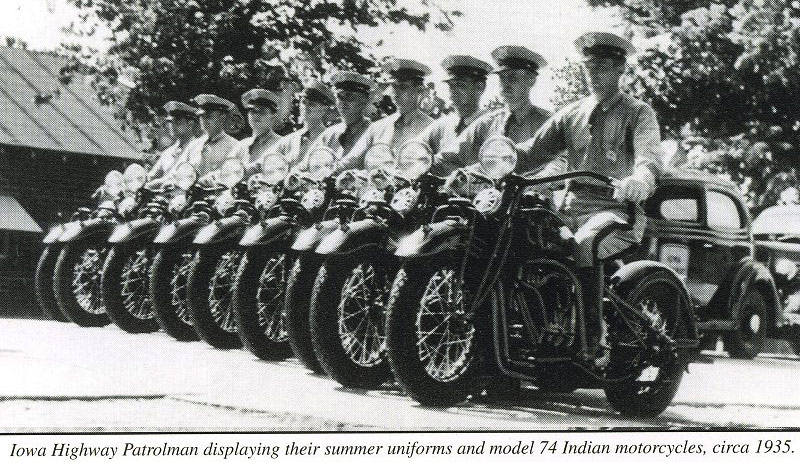
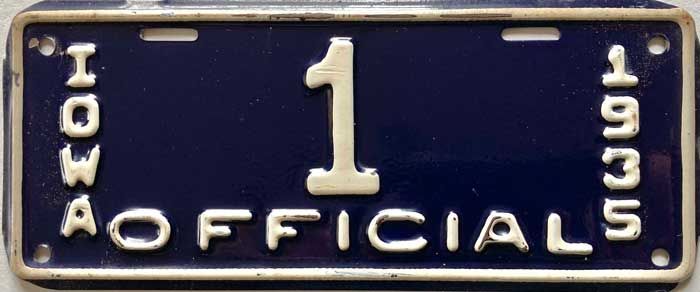 1935 issue. Embossed steel.
1935 issue. Embossed steel. 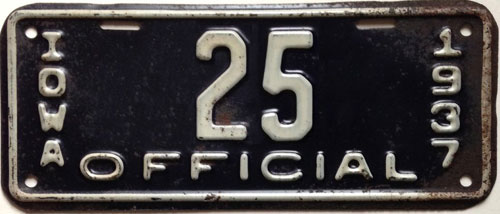 1937 issue. Embossed steel.
1937 issue. Embossed steel. 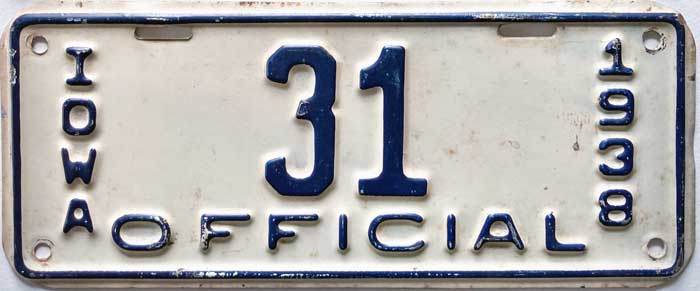 1938 issue. Embossed steel.
1938 issue. Embossed steel. 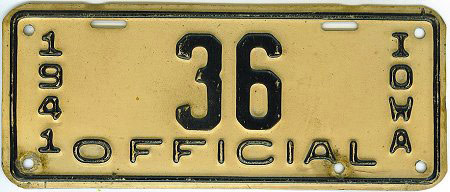 1941 issue. Embossed steel.
1941 issue. Embossed steel. The Iowa Motor Vehicle Enforcement Officer is a peace officer whose primary duty is to enforce all state and federal regulations that apply to commercial vehicles travelling Iowa's roadways. Some of the laws enforced relate to State and federal motor carrier safety regulations, State and federal hazardous materials regulations, Driver qualifications/driver licensing, Vehicle registration, Overweight and over-dimensional vehicles, Fuel tax compliance, Shipping travel authority, and liability insurance.
Their job duties include, but are not limited to:
Inspecting commercial vehicles and drivers to determine compliance with state and federal laws relating to driver qualification, hours of service, driver licensing, vehicle size, weight and vehicle safety compliance.
They enforce traffic laws to promote safety, reduce crashes and expedite traffic flow.
License plates issued to IMVE patrol vehicles currently are all-silkscreened. The full-color IMVE emblem is silkscreened on the left side of the plate. IOWA is silkscreened in a shade or red similar to mauve, as is the title OFFICIAL run along the bottom of the plate. The registration number is screeend in black and comprises three numbers prefixed by MV.
The earlier T prefixed license plates were a hold-over from the old Department of Transportation days and used to differentiate from State Patrol radio call signs.
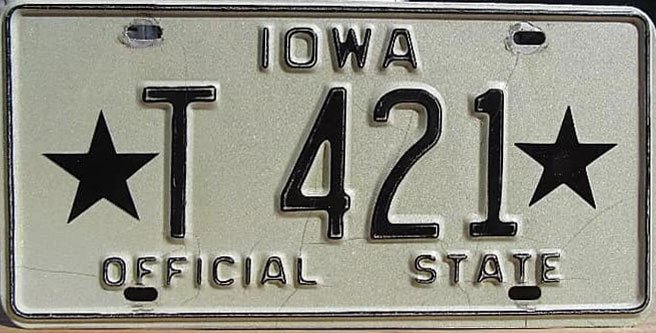 1980's-1990's OFFICIAL STATE issue. Black over white.
1980's-1990's OFFICIAL STATE issue. Black over white.
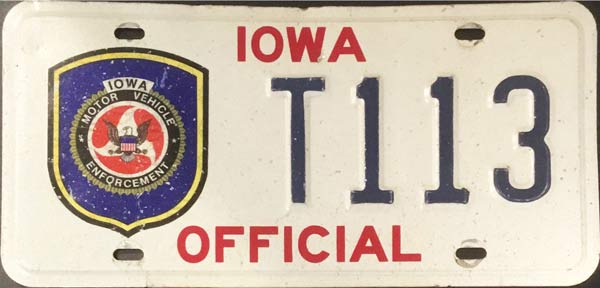 1990's-2000's issue.
1990's-2000's issue. 
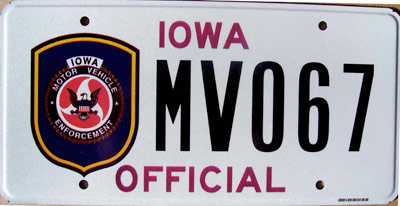 IMVE first graphic issue.
IMVE first graphic issue. 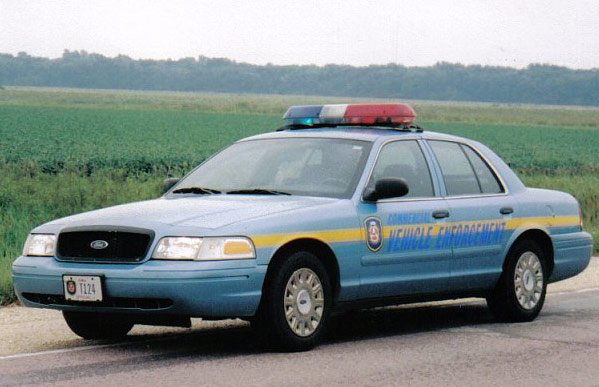 IMVE patrol vehicle
IMVE patrol vehicle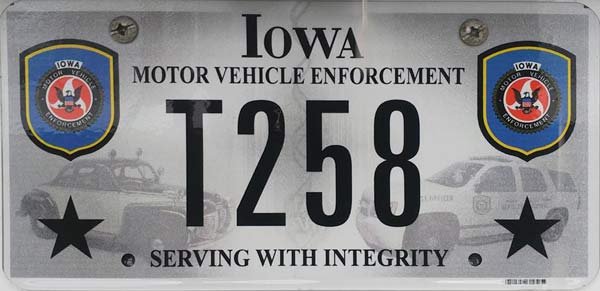 IMVE issue.
IMVE issue.
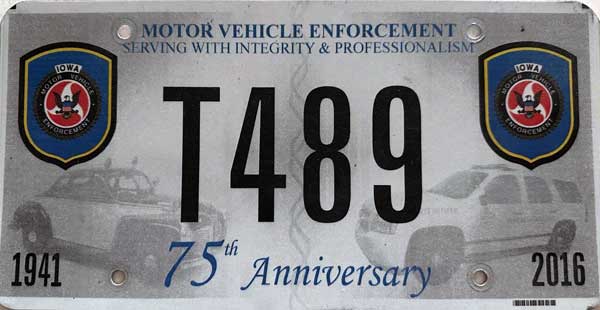 IMVE 2016 issue.
IMVE 2016 issue.
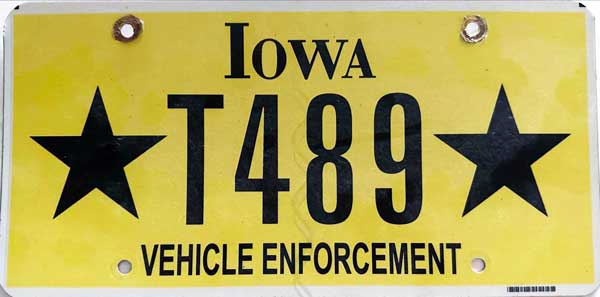 IMVE Current issue
IMVE Current issue
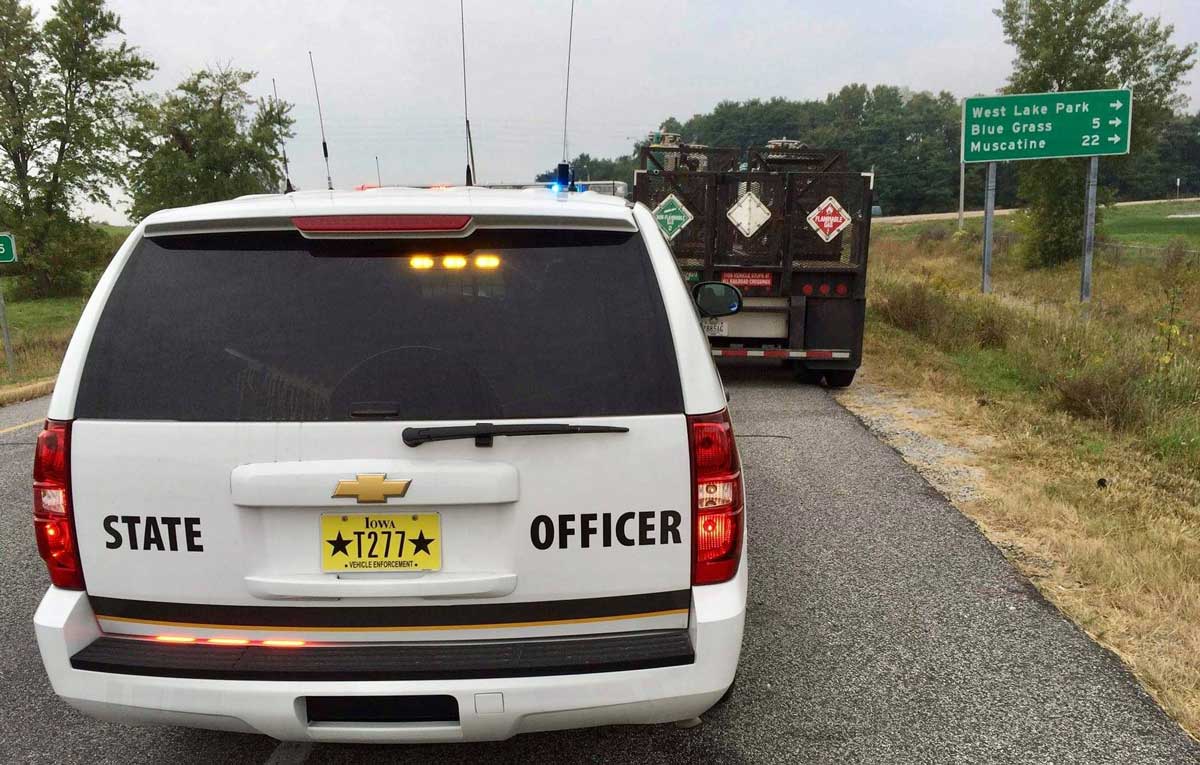 (Courtesy Kip Wills)
(Courtesy Kip Wills) 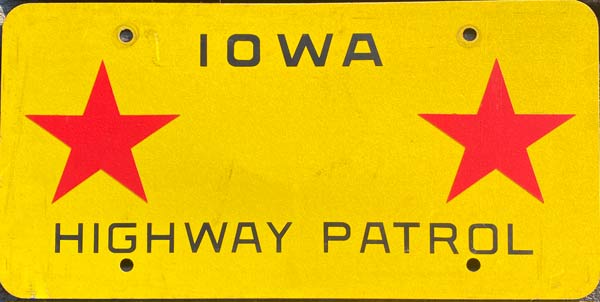 1960's-Early 1970's blank.
1960's-Early 1970's blank.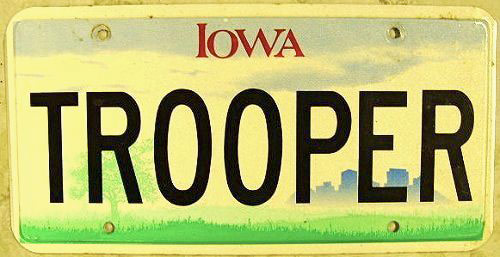 National Troopers Coalition souvenir license plate from NTC Conference hosted by ISP
National Troopers Coalition souvenir license plate from NTC Conference hosted by ISP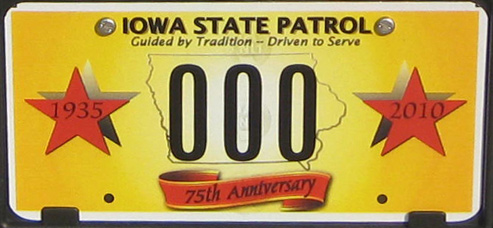 2010 75th Anniversary issue sample plate.
2010 75th Anniversary issue sample plate.